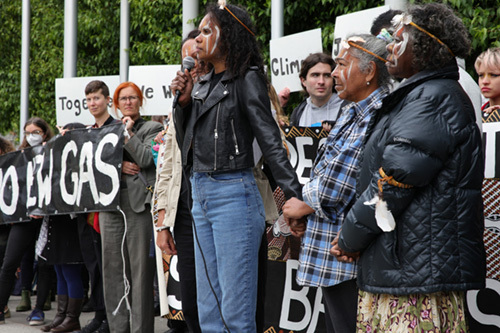- Winter 2023
- Indigenous-led climate litigation in Australia
Indigenous-led climate litigation in Australia


Indigenous2 communities are important stakeholders in climate litigation, both because they are disproportionately affected by climate change due to their connection to their land and dependence on their ecosystems and their expertise arising from at least 65,000 years of caring for such ecosystems in Australia. It is no surprise then that Indigenous plaintiffs are increasingly deploying strategic litigation to attempt to mitigate, and adapt to, the impacts of climate change. What may be more surprising is the level of success these litigants are having.
Strategic litigation (selecting and bringing a case to the courtroom with the goal of creating broader changes in society) aimed at mitigating, or adapting to, the impacts of climate change has seen an extraordinary rise over the last decade. Such litigation seeks to do more than simply validate the legal rights of a party. For example, the litigation in Sharma,3 opened up a public conversation about the Government’s climate policy, tested for truth by leading uncontested scientific evidence contrary to some Government claims and aimed to establish a new duty in tort that could form the basis of a new strand of litigation.
How such litigation is conducted is important. Doing it poorly can reinforce rather than reform the systems you are seeking to change. A particular critique relevant for Indigenous-led climate litigation is the risk of ‘professional lawyers’ prioritising their institutional training and expertise over the lived experience of their clients or failing to recognise where their clients may actively contribute their expertise to such litigation,4 in effect silencing the communities they are seeking to empower. Story and story-telling approaches are also central to such litigation, including recognition of the power that comes from clients being given a platform to speak in their voices about their lived experiences.5
Finally, winning is also a more complex question given that losing a court case might nonetheless deliver the strategic aim of the case (for example, where a piece of litigation is brought to demonstrate a deficiency in law, a loss is necessary to accomplishing that aim’).
Within the global rise of Indigenous-led climate litigation, we have seen Indigenous communities combine both a ‘a wide range of constitutional and fundamental human rights’ drawn from non-Indigenous legal systems with their own lore/law in the form of a ‘solid jurisprudence of Indigenous protection’. Of particular potency has been the use of litigation by Indigenous communities seeking to enforce their rights to free, prior and informed consent to climate change adaptation measures (for example, in the building of windfarms,6 dams7 and (successfully) against government approval of a solar farm on culturally significant land).8 It has been Indigenous nations on this continent who have most recently demonstrated the potency of such litigation however.
Actions by Torres Strait Islander litigants
Torres Strait Islander plaintiffs have brought two novel pieces of litigation criticising the failure of the Australian government both to mitigate climate change impacts through policy directed to the reduction of greenhouse emissions, and to assist the Torres Strait Islands to adapt to the impacts of climate change, most notably, inundation into the islands as a result of rising sea levels.
In May 2019, Daniel Billy and others filed a complaint to the United Nations (on their behalf and that of their respective children) alleging that changes in weather patterns caused by climate change impacted negatively on their traditional way of life, culture and livelihoods. The complaint further alleged that Australia’s insufficient climate mitigation targets, and a general failure to cease to promote fossil fuel extraction and use, contributed to climate change. The complaint was the ‘first legal action grounded in human rights brought by climate-vulnerable inhabitants of low-lying islands against a nation-state’.9
In September 2022, the United Nations Human Rights Committee (UNHCR) handed down a ground-breaking judgment holding that Australia had failed to ‘discharge its positive obligation to implement adequate adaptation measures to protect the… home, private life and family’ of the complainants.10 Surprisingly, the UNHCR also recommended that Australia pay compensation. The decision broke new international law ground: firstly, because it was the first finding that Indigenous peoples’ right to culture was at risk from climate change, and secondly as the first finding by a UN body that a State had violated human rights through inadequate climate policy. It was also a resounding rejection of States’ often invoked defence that their particular climate policy represented a ‘drop in the ocean’ of global emissions.
After filing the UN complaint, but before the Committee’s decision, members of the Torres Strait community also filed a representative proceedings in the Federal Court of Australia alleging that the Commonwealth both owed, and had breached, a duty to take reasonable steps to protect them, their culture and traditional way of life, and their environment, from harms caused by climate change. The breach is said to arise from the Government’s adoption of emissions targets that are inconsistent with the best available science. As part of the conduct of that matter, the plaintiffs also successfully sought an order for the court to take evidence on Country. The complaint seeks damages, injunctive relief and declarations recognising the alleged duty.11 The matter is yet to be heard.

Actions by Tiwi Island litigants
The traditional owners of the Tiwi Islands have instituted multiple pieces of litigation to resist the building of Santos’ Barossa gas project in the Timor Sea, and increasingly look like they will win that struggle. The project received approval from the regulator in March 2022, and community members swung into action. The first salvo was fired in April 2022 when an Indigenous group from the Tiwi Islands and Larrakia country12 sought an injunction in domestic courts in South Korea seeking injunctive relief to block the country’s export credit agencies from funding an associated deep-sea gas pipeline for the project, citing a lack of free, prior and informed consent.13 The case had an immediate effect when the South Korean government reportedly pulled the handbrake ‘on part of a mammoth $US700 million investment into the controversial Barossa gas project’.14
Shortly after, in June 2022, Munupi Senior Lawman Dennis Tipakalippa challenged the approval on the basis of a failure of consultation with traditional owners.15 As part of those substantive proceedings, in July 2022, Mr Tippakalippa sought an interlocutory injunction ‘to prevent drilling until the matter is heard’.16 That application was dismissed, with the court citing Santos’ evidence that any delay to drilling would cause ‘‘a daily loss in the order of hundreds of thousands of dollars’ and prejudicially impact scheduled work on the project’.17 However, ultimately Mr Tippakalippa succeeded, both at first instance and on appeal. On the day Santos’ appeal against the first instance judgment was dismissed, Santos released a statement to the ASX declaring that ‘Santos does not anticipate any material cost or schedule impact’ as a result of the judgment.18 That may have been a mistake. Solicitors acting for the Environment Centre of NT subsequently wrote to ASIC and the ASX asking them to investigate the statements, alleging an ‘inconsistency’ between the evidence provided on the injunction hearing and the ASX statement.19
In the meantime, obstacles continue to arise. In January following a direction from the Regulator, Santos undertook not to conduct construction on the associated pipeline pending an underwater cultural heritage assessment20 and in April 2023, Mr Tipakalippa and others again targeted the financing of the project, lodging a human rights complaint with 12 banks through their internal ‘grievance processes’ over their involvement in the project.21 At the same time, legal complaints were sent to 20 superannuation funds by lawyers for traditional owners accusing the funds of ‘deficiencies in accordance with international human rights principles and fiduciary obligations to act in the best financial interests of members and with the requisite degree of care, skill and diligence’.22 All of this is of course against the backdrop of expected increasing costs for the project as a result of the Commonwealth Government’s safeguard mechanism.23
These cases demonstrate effective, ground-breaking litigation led by Indigenous communities on this continent, and they could be only the start. Central stakeholders in the climate, with hundreds of years of experience seeking change in legal terrains too often hostile to their knowledges and self-determination, Indigenous communities also have advantages as strategic litigants. They have a recognised unique status with regard to standing24 and potentially potent rights and interests. For example, the recent recognition of the right to a ‘clean, healthy and sustainable environment’ as customary international law25 would appear to provide a ‘hook’ for remedies under Section 9 of the Racial Discrimination Act 1975 (Cth). Similarly, domestic and international laws or policies relating to cultural heritage, sacred sites, land rights, native title and, increasingly, free, prior and informed consent, all provide potential avenues for Indigenous-led climate litigation.26 Further, an increasing focus on both director’s duties and sustainable finance taxonomies is fertile ground for challenges to project funding.
Though patently unfair given they did not cause the crisis, it may be that old knowledges are the best hope we have for a new future. BN
ENDNOTES
1 The authors wish to acknowledge the efforts of Nikki Saini who conducted important research for this article.
2 The authors use the term ‘Indigenous’ interchangeably with ‘Aboriginal’ and ‘First Nations’ in this piece, though we recognise that different views exist among Indigenous nations as to the appropriateness of the various terms. Where a particular nation or community is referred to, they are referred to by name.
3 Sharma by her litigation representative Sister Marie Brigid Arthur v Minister for the Environment [2021] FCA 560.
4 Gerald Lopez Rebellious Lawyering (Westview Press, 1992).
5 Larissa Behrendt, ‘Indigenous Story-Telling: Decolonising Institutions and Assertive Self- Determination and implications for Legal Practice’ in Jo-ann Archibald Q’um Q’um Xiiem, Jenny Bol Jun Lee- Morgan, Jason De Santolo (eds) Decolonizing Research Indigenous Storywork (Bloomsbury Publishing, 2019); Rachel Ball, When I Tell My Story I’m in Charge: Ethical and Effective Storytelling in Advocacy (Victoria Law Foundation, 25 November 2013).
6 European Center for Constitutional and Human Rights, ‘Case Report: Wind Farm in Mexico: French Energy firm EDF disregards Indigenous rights’, https://www.ecchr.eu/fileadmin/Fallbeschreibungen/CASE_RESPORT*EDF*MEXICO_NOV2020.pdf.
7 ‘Survival International vs Salini Impregilo’, OECD Watch(Webpage) <https://www.oecdwatch.org/complaint/survival-international-vs-salini-impregilo/>.
8 Quechan tribe v U.S. Dept. of Interior, FederalSupplement 755,1104.
9 Maria Antonia Tigre, ‘Climate Change and Indigenous Groups: The Rise of Indigenous Voices in Climate Litigation’, ePublica, 9(3) December 2022 (214 - 260), 225.
10 Daniel Billy et al v Australia, UN Doc CCPR/ C/135/D/3624/2019, 15 [8.12].
11 Pabai Pabai and Guy Paul Kabai, ‘Concise Statement’ No 622 of 2021, 31 March 2022, [31] – [32].
12 Aaron Bunch, ‘Santos gas project faces financing delay’,7news, 21 April 2022 <https://7news.com.au/business/santos-gas-project-faces-financing-delay-c-6521653>.
13 Nte xxi.
14 John Buckley, ‘Indigenous Australians have derailed a controversial gas project by suing the South Korean Government’, Vice (online), 7 April 2022 https://www.vice.com/en/article/akv94k/Indigenous-australianshave-derailed-a-controversial-gas-project-by-suing-thesouth-korean-government.
15 The timeline for these proceedings is listed at the bottom of Environmental Defenders Office website,‘ASIC and ASX asked to investigate whether Santos misled investors over Barossa gas project’ https://www.edo.org.au/2022/12/15/asic-and-asx-asked-toinvestigate-whether-santos-misled-investors-overbarossa-gas-project/.
16 Nte xxiii.
17 Nte xxiii.
18 Santos NA Barossa Pty Ltd v Tipakalippa [2022] FCAFC193; Santos, ‘Full Federal Court decision for the Barossa Gas Project’, 2 December 2022, https://www.santos.com/news/full-federal-court-decision-for-thebarossa-gas-project/.
19 Environmental Defenders Office, ‘Draft Letter of complaint to ASIC’, 15 December 2022.
20 Peter Milne, ‘Indigenous culture concerns again hit Santos’ $6.1b Barossa gas project’, Sydney Morning Herald (online), 24 January 2023 <https://www.smh.com.au/business/companies/Indigenous-cultureconcerns-again-hit-santos-6-1b-barossa-gas-project-20230123-p5cewo.html>.
21 Jack Hislop, ‘Tiwi Islands traditional owners lodgehuman rights complaint against banks over $1.5b Santos loan’, ABC News (online), 4 April 2023 https://www.abc.net.au/news/2023-04-04/tiwi-islandshuman-rights-complaint-bank-santos-barossagas/102184122.
22 Hannah Wootton, ‘Super funds under attack from their own members over Santos investment’, Australian Financial Review (online), 26 April 2023, https://www.afr.com/companies/energy/super-funds-under-attackfrom-their-own-members-over-santos-investment-20230426-p5d3bk.
23 Daniel Fitzgerald, ‘Future of Santos’s $4.7 billion Barossa project unclear after safeguard mechanism reforms’, 31 March 2023 <https://www.abc.net.au/news/rural/2023-03-31/santos-barossa-gas-projectunclear-safeguard-mechanism-reforms/102154622>.
24 Onus v Alcoa of Australia Pty Ltd (1981) 149 CLR 27.
25 United Nations General Assembly, GA Res 76/300, 76th sess, Agenda Item 74(b), UN Doc A/RES/76/300.
26 Northern Territory v Mr A. Griffiths (deceased) and Lorraine Jones on behalf of the Ngaliwurru and Nungali Peoples [No 2] [2019] HCA 19.
